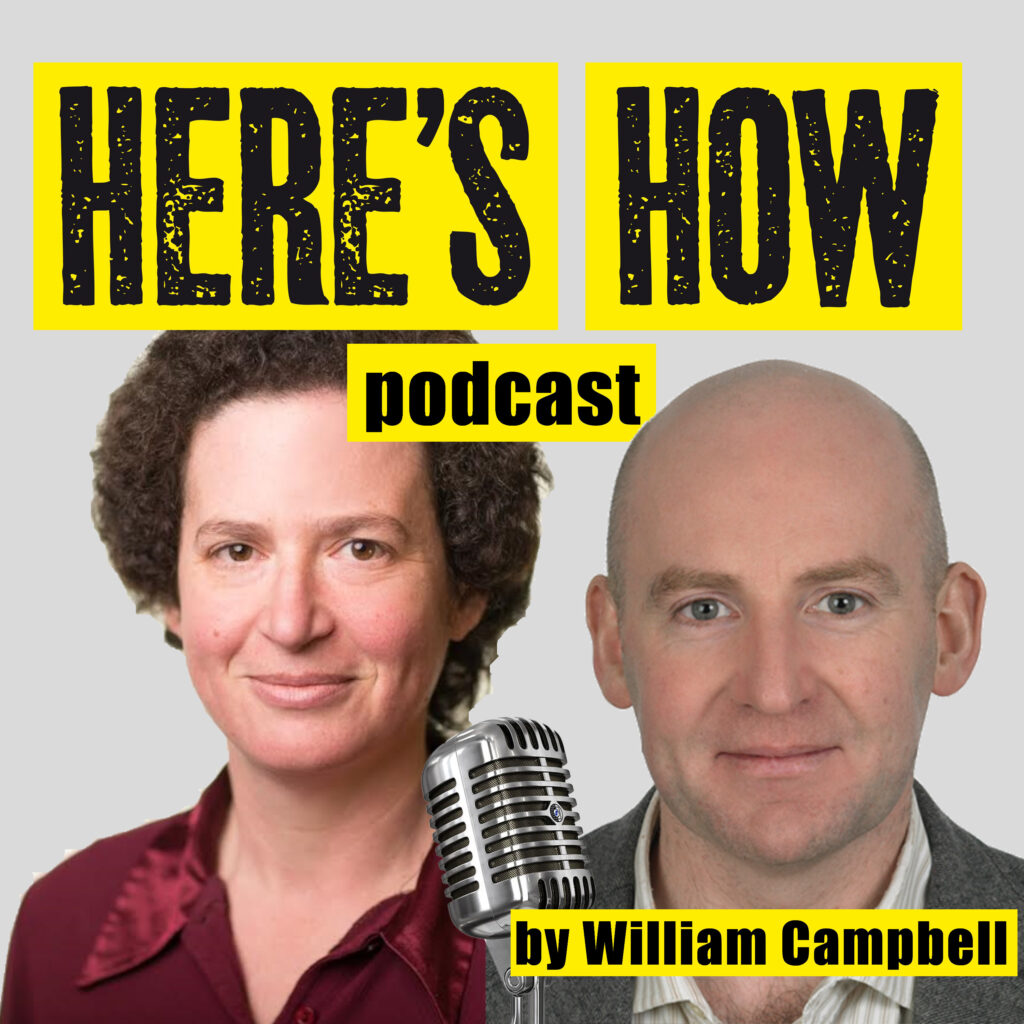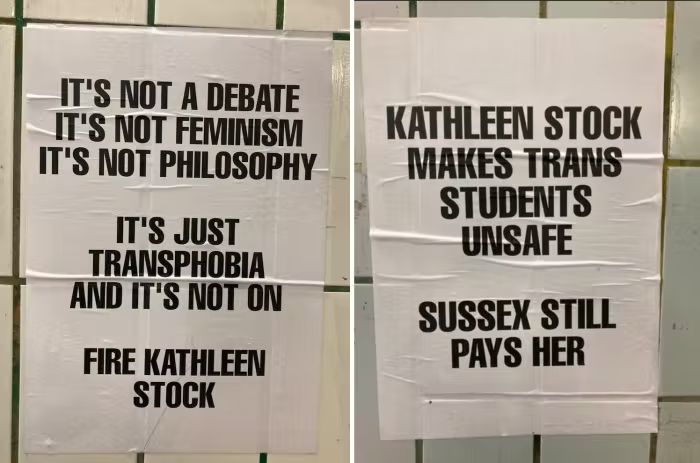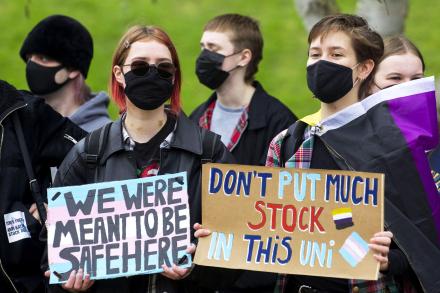Podcast: Play in new window
Subscribe: Apple Podcasts | RSS | More
Sarah Hurst is a journalist who has been reporting on Russia for thirty years – her interview starts at 15:00.
*****
Sharon Keogan is an independent member of Seanad Éireann, she’s one of those independent politicians who discovered her deeply-held belief in independent politics, just after she discovered that she had failed to get a nomination to run as a Fianna Fáil candidate, despite being on that party’s national executive.
She’s made a career of gaining publicity off the back of baiting public outrage with ludicrous statements targeting vulnerable members of society, such as when she said that disabled children should be microchipped. She’s cute enough to couch her trolling in terms of concern, while dog-whistling to the lowest instincts in society.
She hit the news again recently when she was criticised for saying to witnesses before the Joint Committee on International Surrogacy – a married gay couple who had adopted a child via surrogacy – that surrogacy was “harmful, exploitative and unethical” and “not in the best interest of the child“. She went on, “I don’t believe it is everyone’s right to have a child. It is a privilege to give birth.“
The Committee chair, Sinn Féin’s Kathleen Funchion suspended the meeting after Senator Lynn Ruane complained that a personal attack on witnesses was not appropriate, and asked for an apology, which Keogan refused.
Keogan later resigned from the Joint Oireachtas Committee on Children, Equality, Disability, Integration and Youth, in an email with the subject line “Unsafe Working Environment/ Resignation”, she wrote “I no longer feel safe or protected as a member of the committee and have made this difficult decision as a result of that.”
I don’t want to talk about surrogacy here, I more want to talk about Keogan’s excuse, particularly this guff about being safe or protected as a member of the committee – she is clearly trying to draw a link between perfectly valid criticism of her – and her not being safe. And let’s be clear here, Senator Keogan is not behind the door when it comes to dishing it out, the incident started when she made a personalised attack, not on a political opponent, but on witnesses who came to a private committee meeting to tell their personal story. A political opponent criticised her for doing that, and she resigned in a huff saying that she wasn’t safe because of that criticism. Leinster House is not exactly the place you go if you want to avoid hearing nonsense on stilts, but even by those standards, the notion that she might be in physical danger in literally the most secure building in the country is really a special kind of stupid.
Except she didn’t quite say that, she left herself a little escape hatch. She said that she didn’t feel safe, leaving open the possibility that she actually was safe, but was just wrong about her feelings. This is a cheap and nasty trick, it’s an attempt at a smear from someone who doesn’t have the guts to stand over what they are saying, so they couch it in the unfalsifiable terms of what they feel.
This trick is actually well known, it’s even taught in that type of how-to-get-your-own-way in business tactics books; people are advised to not to say I will work better if I can work from home, but instead say I feel I will work better if I can work from home because nobody can really argue with you that you don’t feel that way.
That said, Keogan is a conservative, and liberal and left-wing commentators delighted in ridiculing her nonsense, but there is no question that her rhetoric, this line in particular, such and such makes me feel unsafe, is lifted straight from a strain of left-wing liberal discourse, and it’s particularly associated with trans rights activists.
It doesn’t matter who is using it, the tactic is the same. It comes from someone who knows they are losing an argument, so they want to shut down the discussion; they are not satisfied with just not participating, not playing the game when they know they are not going to win. They also demand that nobody else participates in the discussion either. They don’t just want to not show up to the debate; they demand that everybody validate their decision by them not showing up too, and if they can find something that looks like an authority, they will run off there demanding that this ban on debate be enforced.
That’s exactly what Keogan did when she sent her self-regarding, attention-seeking poor-me email, copying all the members of the committee of course to make sure it got in the press, claiming that she wasn’t actually storming off in a strop, but that she was too threatened to take part. It would have been close to being defamatory, if it wasn’t too stupid for anyone to take seriously; but the clear intention was to de-legitimise the discussions of the Joint Committee.
That’s exactly the intention when, as happened recently, a philosophy professor at Sussex University, Kathleen Stock was forced out of her job because a certain cohort of trans rights advocates objected to her expressing views on the topic. For the record, she has said “I gladly and vocally assert the rights of trans people to live their lives free from fear, violence, harassment or any discrimination”, but she also said that trans women, that’s to say people who are born male but transition to be women; she said that they should not be given access to certain female-only spaces and activities, on the basis of gender self-declaration alone.
In this case some trans rights activists went further, they said that Professor Stock holding these views and being employed at the university, made them unsafe. Not feel unsafe, made them unsafe. They literally said that. People, who didn’t have the courage to put their name to their views, put up anonymous posters around the university saying quote “Kathleen Stock makes trans students unsafe” and others to the same effect.
I want to be clear here that I am by no means attributing these views or tactics to all trans people, or even a majority of them; and there is no evidence that any more than a handful of the trans rights activists are themselves trans. I’m not actually going to get into the actual trans issue here, that’s for a different time, I’m interested in the debating tactics.
As I understand it, the chain of logic is something like this: trans people have a significantly elevated risk of self-harm, and death by suicide – that bit’s true, there’s well-established data. Victimization, bullying, violence, family rejection and discrimination are risk factors for suicide and self-harm. ‘Cause’ is a tricky word here, but in common parlance, that’s true too, there’s solid research that rejection causes suicide among trans people. And the views and expressions of people like Kathleen Stock, and JK Rowling and some others constitutes rejection, therefore it is objectively harming trans people and likely to cost their lives.
That bit, not so much.
The problem there is the jump from the type of rejection that is associated with higher suicide levels, and the type of what some trans rights advocates call rejection from Kathleen Stock and others. It’s important to note that the type of rejection that was studied and found to be associated with higher suicide rates is the likes of being disowned, rejected and possibly violently attacked by your own family, possibly as a teenager, violent street attacks, discrimination up to, for example, complete exclusion from society and employment and the poverty that brings, violence associated with prostitution and so on.
You don’t really need to be an expert to understand that someone who has suffered a lifetime of that will be at elevated risk of suicide.
There are a variety of voices around the trans issues, but as far as I can find, there isn’t any research that suggests that simply disagreeing with someone on some of those issues would drive them to suicide, or expose them to any other risk for that matter. Remember what Kathleen Stock said was “I gladly and vocally assert the rights of trans people to live their lives free from fear, violence, harassment or any discrimination”, but as I understand it, she thinks that female-only spaces like girls’ changing rooms and women’s prisons should be for biological women only.
I should note that another issue that trans rights activists raise is that trans people shouldn’t be invalidated, or have to debate their own existence.
I’m with them on this principal. To take a catastrophist comparison, you couldn’t remotely expect Jewish people to show up to the Wansee Conference to calmly debate to what extent the holocaust should go ahead, and had it been possible, you couldn’t reasonably expect them to do anything other than protest and disrupt it as much as they could.
But the point is that is a catastrophist comparison. There are certainly a lot of people out there saying horrible things about trans people, but that doesn’t include Kathleen Stock, and there are issues to be discussed, such as, as I mentioned, female-only spaces like girls’ changing rooms and women’s prisons. There’s also the issue of trans children – do you take a four-year old child – biologically female – any more seriously if they say ‘I’m a boy’ than if they say ‘I’m a dinosaur’? that’s a real case, by the way. The parents went public on it, along with full names and many photos of them and their children, saying that they had permission from their child – aged four – to do so.
There is just no evidence that calm public discussion of these issues makes anyone ‘unsafe’.
One other point that the trans rights activists is that even if, for example, Kathleen Stock isn’t a direct threat to them, she encourages or ‘enables’ other people who are a threat. In principle, this concept does have merit. There are situations where a speaker on a topic ostensibly stays on the right side of a line, not advocating violence, but the totality of their contribution gives the impression that they are sending a coded message, winking at people who are willing to commit violence to let them know that they really support them. Donald Trump comes to mind here, saying some of the far-right marchers at Charlottesville were ‘very fine people’.
When Sharon Keogan says disabled people should be microchipped, rightly or wrongly, that certainly could be read by some people as support for drastically infringing their human rights. But whether you read the lines, or between the lines, or anywhere else, it is abundantly clear that that Professor Stock is going out of her way to be clear that she supports the civil rights of trans people.
And to get back to Senator Keogan. She claimed that people just saying that they disagreed with her stance and style of questioning made her ‘feel unsafe’. Given that the chance of actual violence against her in an Oireachtas committee is zero, there is a clear solution here. Lots of people have harmless phobias – they’ll run to get someone else to take a spider out of the bath for them or whatever. But when those phobias cross a line where they interfere with the conduct of their life – they’re so scared of cancer that they won’t walk down a street where there’s a cancer hospital – that’s meets the clinical definition of a psychiatric condition. If Senator Keogan can’t do her job because of an irrational fear of being attacked, she needs psychiatric treatment. Unless, of course, she’s lying. Either way, she has no business being in politics.
And, be it in universities, or anywhere in public life, people who go way beyond what is supported by evidence, and claim that people who disagree with them should be fired or sanctioned in some other way, supposedly to protect their safety, won’t win any arguments like that, and you just have to see the glee with which that is reported in the right-wing press to understand that. Nobody should have to put up with abuse, but if someone is, or feels, threatened by normal, robust public debate then it’s on them to withdraw from it.
It’s just not possible to have a society if anyone at any time can push a button labelled ‘I feel unsafe’ and use it to close down any discussion they don’t like.










